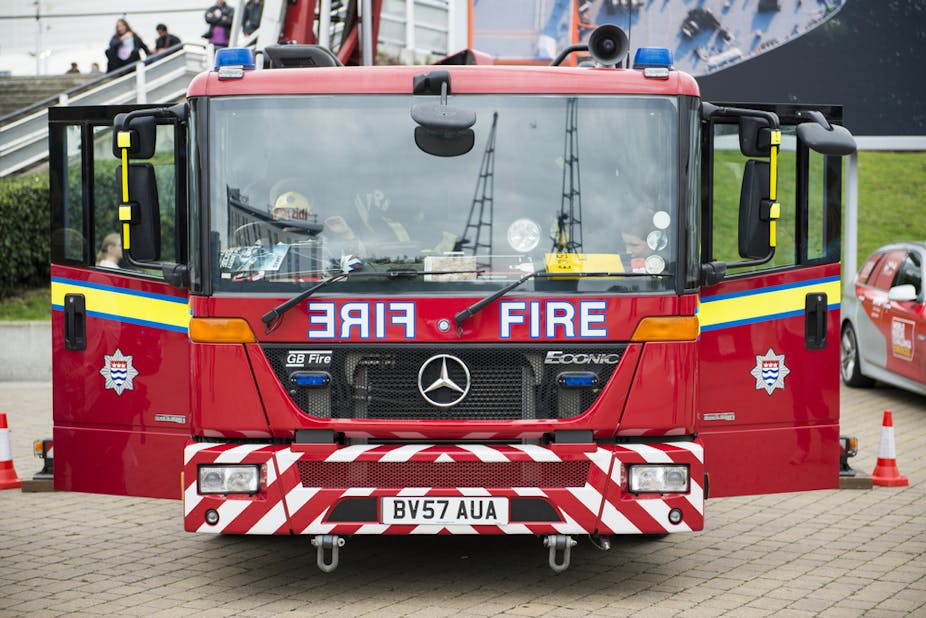Firefighters occupy a unique and special space within the public’s affections. Few other groups of individuals take such risks with their own lives on a daily basis for the protection and benefit of society. Few of us can contemplate the sheer bravery and self-sacrifice of rescuing someone from a burning building.
Yet Peter O’Rielly, county fire officer and chief executive of Greater Manchester Fire and Rescue Service, tweeted in late September that he felt “ashamed” to be a firefighter. O’Rielly – whose twitter account is no longer online – was responding to negative reactions from his staff to proposed changes that will introduce a controversial new 12-hour shift system in April 2017. With £14.4m to be cut from the service’s budget over the next four years and a changing landscape in which services need to be delivered differently, O'Rielly’s tweet reflects the bitterness of feeling within the fire service about the impact of ongoing reforms.
In May 2016, the then-home secretary, Theresa May, set out bold and substantive proposals for change to the fire service. Citing her previous reforms to the police force, she articulated her vision of a more ethnically diverse, accountable and much slimmer fire service. Rethinking shift patterns and how we deliver frontline fire services are obvious items on any agenda for change. But the fire service is very different from the police force and it does not follow that what may have worked in one of the public sectors will work in another.
Some may argue that firefighters enjoy generous benefits and shift patterns unheard of within the wider public sector. Put that together with significant pension contributions and other benefits, and the life of the typical firefighter seems a very comfortable one. With an annual starting salary for a trainee of £22,017 and opportunities for quick progression, asking firefighters to reconsider how they work and when in order to deliver services more effectively does not sound unreasonable.
But others would argue that dismantling the terms and conditions of service that firefighters have enjoyed for decades is regressive and just plain dangerous. Firefighter unions are battling against the reforms, which they argue could lead to bitter and protracted industrial action and ultimately have no tangible benefit. They argue that the system we have works and if we want to both protect against fire and prevent it then we need to pay for it.
If it ain’t broke
Firefighters are employed on either a wholetime – their terminology for full-time – or a retained basis. Wholetime firefighters normally work a shift pattern of four days on and four days off. Retained firefighters have other regular day jobs and are used as and when they are required with the permission of their employers. But delivering frontline fire-fighting services using a four-day cycle can be expensive. It can also result in a disjunct between the amount of firefighters working at any one time, and how much the public actually needs them.
And firefighters are simply not as busy as they used to be. This is largely attributable to fire services focusing on raising awareness of better fire protection together with the use of fire resistant materials in the home. In 2014-15, there were approximately 496,000 incidents attended by the fire service in England, compared to 1,016,000 in 2003-4 – a 51% drop. Dealing with these incidents were 44,000 full-time equivalent fire and rescue staff in England as of March 2015 – a drop of 12.6% compared to ten years ago.
Fight fire with fire
Research I conducted in 2015-16 in a large fire service for my unpublished PhD revealed strong objections among firefighters to changing existing shift patterns. In interviews I conducted with firefighters, they saw reducing hours as being unfair and tantamount to an attack on their fundamental employment rights. But they also recognised that the model for delivering frontline firefighting needed change and reform.
Huge advances in fire protection and safety visits meant that this particular fire service – which cannot be named for confidentiality reasons – was dealing with far fewer fires. That has to be applauded and so too do its efforts in promoting diversity and equality among staff.
At the service I looked at, many of May’s suggestions for improvement were already being met both prior to and after she announced her reforms – and this is replicated by many fire services in the UK. Driving a coach and horses through existing employment terms seems incongruous with a more open, transparent and inclusive dialogue with everyone affected by May’s proposals.
Many firefighters and senior managers recognise the case for change, but this needs to be carefully positioned within a wider debate on how fire services could make other savings. Sharing premises with other emergency service providers like the ambulance service, modernising inefficient fire stations and maximising technology are possible avenues to consider. There is no shame in opening what might be an uncomfortable dialogue and working with firefighters and trade unions to find a shared solution.
But unilaterally changing firefighters’ employment terms is something we should be ashamed of. Firefighters should fight fire with fire and resist May’s unworkable calls for reform.

